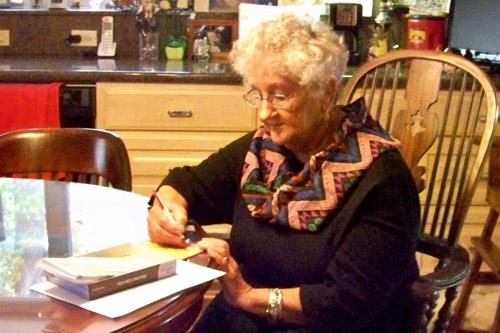

Companions on the Journey, Part 3: Final installment in a series on grief and reaching out for support during the holidays
Laura Humphries, team facilitator for the Our Lady of the Holy Souls grief support ministry in Little Rock, understands the common reaction to the holiday season from people who are grieving.
“Many people want to crawl into a hole the Wednesday before Thanksgiving and not crawl out until Jan. 2,” she said.
Whether it has been a recent loss or one many years in the past, this time of year can be painful.
“It is our responsibility as facilitators to give our participants the tools to deal with any difficulties that might arise during the holidays,” Humphries said. “They say that all of these special events — Thanksgiving, Christmas, New Year’s and anniversaries — are going to be different. And we have to come to accept this. That is why it helps in making plans for the holidays that a person makes them a little different, such as perhaps planning a trip.”
Last year, in an effort to support participants in their program, Humphries researched ways to help people in the grieving process during the holidays.
“I was trying to find something we could do for our participants when I came across a website, Grief Share, that introduced the idea of a beautiful ceremony — Blue Christmas — a simple service of remembrance for a loved one during the holidays,” she said.
This year’s event is planned for Tuesday, Dec. 22 at 6:30 p.m. in the church.
The ceremony starts with an opening prayer and a reading, followed by lighting four candles, representing grief, courage, memories and love. When lighting the candles, the leader speaks to the group, followed by a period of silence.
The participants then take turns coming up to the altar where the candles are displayed to talk about the loved one, to show a picture, to tell a story or share a memory. When this is finished, the ceremony is concluded with a reading and the Lord’s Prayer.
Humphries pointed out the importance of physical objects.
“At the end of our second session, each person was given a candle to hold while we prayed,” she said. “These candles were something tangible to remember a loved one by. And this is significant because ritual in grief is so important, just as a funeral is important to those grieving.”
In the daily routine of the holiday season, Humphries suggested “giving yourself permission to go through the days ahead in a way that gives you comfort. If you don’t want to go to a party, don’t go, if you don’t want to celebrate Christmas in the usual way, don’t do it.”
One thing she suggested is to get the family together to talk about the deceased at some point during the holidays.
“Remember to use the name of the loved one,” Humphries said. “Sometimes people hesitate to use the name in fear of hurting the surviving relative. As a family, members could perhaps share their stories about that person around the dinner table as part of the healing process.”
Another thing to consider is the opportunity to volunteer to serve in some capacity at a non-profit organization, such as the Salvation Army or a church sponsoring a dinner during the holidays for the homeless. This might be especially beneficial to a widow or widower with no children.
A Coping with the Holidays Checklist by Helen Fitzgerald can be found on the American Hospice Foundation website at americanhospice.org.
Please read our Comments Policy before posting.
Article comments powered by Disqus Apply now for diocesan School of Spiritual Direction
Apply now for diocesan School of Spiritual Direction
 Parish highlights German connection with holiday market
Parish highlights German connection with holiday market
 Veterans Day Mass honors service and God’s soldiers
Veterans Day Mass honors service and God’s soldiers
 A Catholic You Want to Know: Debbie King
A Catholic You Want to Know: Debbie King
 Winning directory photo honors Our Lady of Guadalupe
Winning directory photo honors Our Lady of Guadalupe
 St. Paul says: How does the Bible define love?
St. Paul says: How does the Bible define love?
 6 steps to getting married in Diocese of Little Rock
6 steps to getting married in Diocese of Little Rock
 Most frequently asked questions on Catholic marriage
Most frequently asked questions on Catholic marriage
 St. Joseph a model of solidarity with immigrants
St. Joseph a model of solidarity with immigrants
 Two gifts after Jesus’ death: Virgin Mary and Eucharist
Two gifts after Jesus’ death: Virgin Mary and Eucharist
 Why we have an altar, and not just a communion table
Why we have an altar, and not just a communion table
 Pope: Wars should be resolved through nonviolence
Pope: Wars should be resolved through nonviolence
 Living relationship with Jesus Christ in the Eucharist
Living relationship with Jesus Christ in the Eucharist